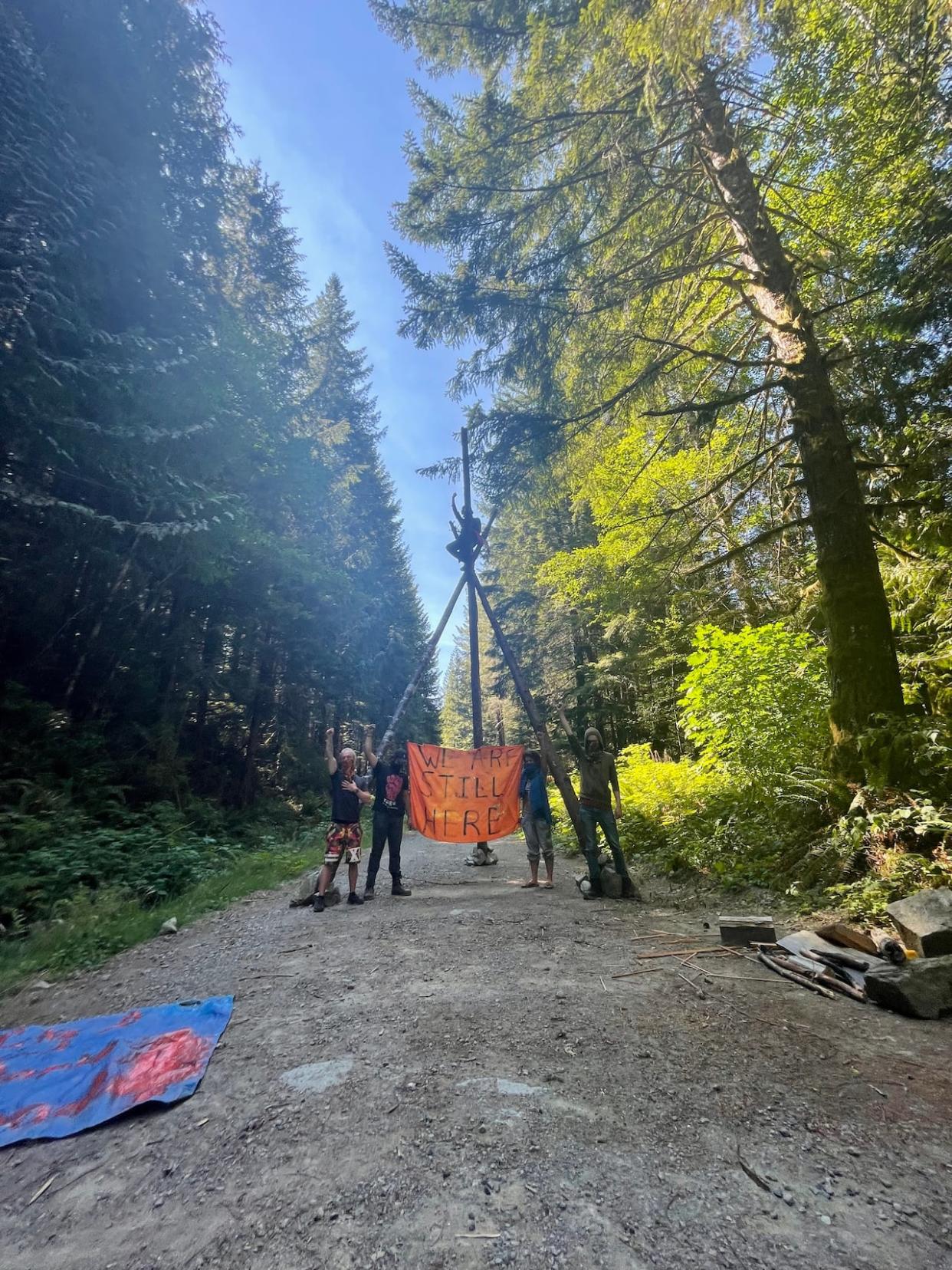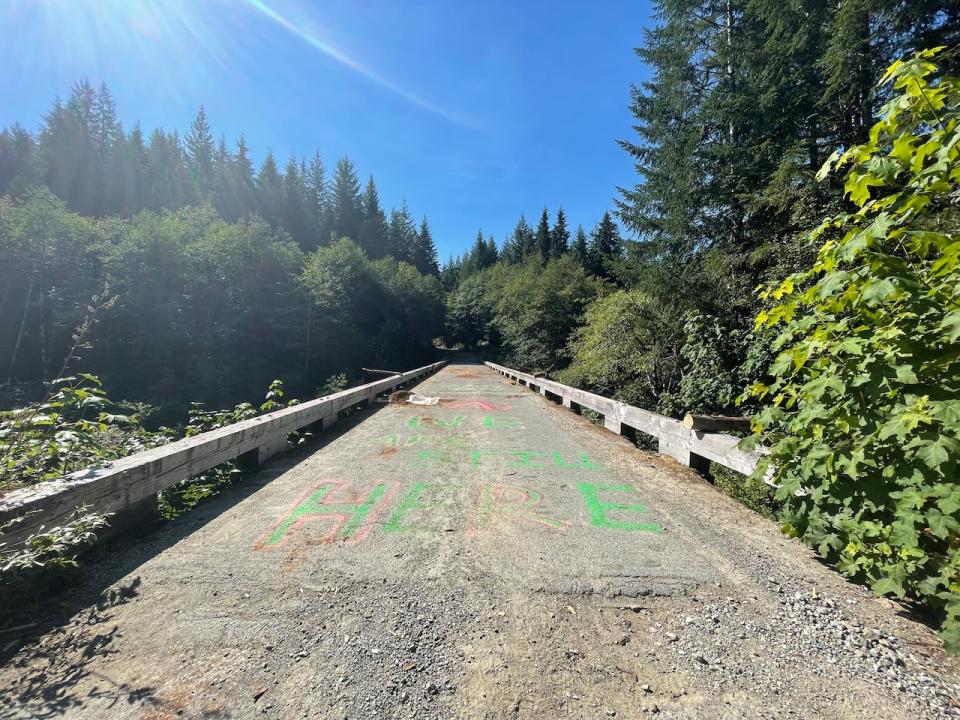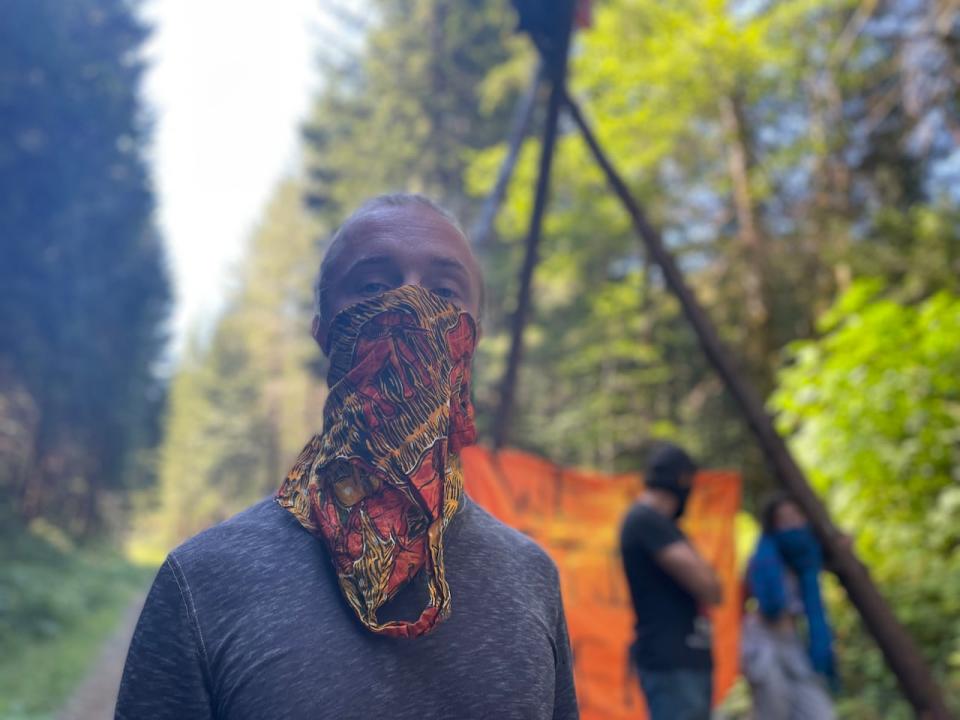Why protest group 'Savage Patch' continues to protest old growth logging in the Fairy Creek injunction area

Clear-cut trees are visible across the heavily forested mountainside that makes up the Fairy Creek injunction area on Vancouver Island.
To Megan Einarson, who was arrested in the recent Fairy Creek protests and has returned to join a new group in opposition to old growth logging, it's difficult to see how many trees have been felled since the protests.
"There are people that will still mourn the trees that they sat with that are now gone because they are logged," Einarson said.
The latest group to protest in the injunction area, called Savage Patch, says they are an Indigenous-led movement focused on Indigenous sovereignty and the protection of old growth forests.
On Aug. 15, RCMP arrested three protesters from Savage Patch for breaching a court-ordered injunction after the group blockaded a bridge to prevent logging company Teal Cedar Products from logging in the area.
Some of those involved in Savage Patch were also present at the Fairy Creek protests, although they say their group is a separate movement and that they follow the guidance of Pacheedaht elder Bill Jones and other First Nations members opposed to the logging.

A bridge in the Fairy Creek injunction area, which runs over the Gordon River. On Aug. 15, RCMP arrested three protesters from Savage Patch for breaching a court-ordered injunction, after the group blockaded a bridge to prevent Teal Cedar Products from logging in the area. (Emily Fagan/CBC News)
Leaders from the Pacheedaht First Nation say the protesters do not represent them, and have asked that Savage Patch respect the nation's rights to manage their territory without interference.
"Our chiefs have repeatedly asked the blockaders to peacefully leave our territory, but they refuse and continue to trespass," the nation said in a statement to CBC News.
"Since time immemorial the Pacheedaht have managed this land in an environmentally conscious manner, and we continue to do so today."
'We're against ... the cutting of ancient forests'
All that remained on the bridge that held Savage Patch's blockade are scraps of wood, spray painted messages, and a stuffed owl — which members of the group say represent endangered species in the area, such as the western screech owl, which they seek to protect through calling for logging to end in the region.
Peter Orlić, a member of Savage Patch, said it's a misconception that their group is against industry.
"I think most of us aren't against logging in general — we're against clear-cutting, we're against the cutting of ancient forests," he said.
Teal-Jones, which owns Teal Cedar Products, did not respond to the CBC's request for comment.
Further up, tree limbs, large stones and metal wire littered the road. Although Savage Patch set up their main camp in the woods, they have a small camp on the road, with a wooden tripod structure and signs painted on tarps, including one reading, "Let's take a stand for the people of this land."
There was also an extinguished campfire. A person involved with the group said a fire was used in a ceremony by Indigenous members of the blockade.

Kyle Grimm, a Savage Patch member, stands in front of a structure that protesters built on a logging road. (Emily Fagan/CBC News)
Enforcement of the injunction by the RCMP has so far been "mild" compared to actions at previous Fairy Creek protests, according to Savage Patch member Kyle Grimm.
Grimm said about 25 to 30 RCMP officers arrived early morning on Aug. 15 with helicopters and drones, and quickly dismantled the wooden barricade.
The three people arrested were released after a few hours. According to Lake Cowichan RCMP, one protester allegedly assaulted a police officer before running away into the woods.
Although the protesters refused to disclose their current tactics or future plans, they said they intend to maintain their presence in the area.
"I believe we will continue to hold our position in whatever way we need to continue to make it known that we will stand with our planet and Indigenous individuals as long as we need to," said Grimm.
Largest act of civil disobedience in Canada
In the wake of the Fairy Creek protests, considered the largest act of civil disobedience in Canadian history, B.C. deferred logging in several areas of endangered old growth forests and boasted a 42 per cent decrease in old-growth logging.
However, trees in active cutblocks — forest areas where timber harvesting is authorized — that protesters sought to save were all chopped, and there is no guarantee the old growth trees in deferred regions will be preserved indefinitely.

Protesters march during a demonstration against old-growth logging, at the Teal-Jones Group sawmill in Surrey, B.C., in May 2021. Teal-Jones holds licences allowing it to log in the Fairy Creek Watershed on Vancouver Island. (Darryl Dyck/Canadian Press)
Although the legal case against Einarson in the Fairy Creek protests was thrown out, she says she doesn't feel good about it, and that some leaders in that protest — such as Jones — are facing expensive legal disputes with Teal Cedar.
"It feels like I got off when people who really put in their life and really broadcast themselves are now being severely punished," she said.
What brings Einarson back to the injunction area, she says, is the hope that what Savage Patch is doing will forge a path for logging in the region to end, so forests can begin to regrow.
"I feel like I'm on the right side of history in being here."


